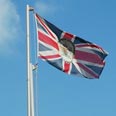
The British public’s perception of journalists has sunk so low that when I am asked in social situations what my job is, I am sometimes tempted to pretend I am part of a more respected profession – like drug trafficking. I exaggerate, of course, but only a little. Most people view journalists as immoral liars who would sell our own grandmothers for a front-page scoop. I am an altogether softer writer, so when members of my profession publish sensationalist or intrusive stories, I don’t sit and flog myself on their behalf.
However, when the National Union of Journalists (NUJ) passed a motion at its annual meeting to boycott Israel, I hung my head in utter shame and despair - despite the fact that I am no longer an NUJ member. Those emotions of shame and despair were not joined by shock, though, because the British media has long been absorbed by a blind hatred of Israel. Newspapers like The Independent and The Guardian print editorials that are so biased and distorted that Osama Bin Laden would probably blush at them. The BBC refuses to describe suicide bombers who blow up buses full of schoolchildren as "terrorists" and one of its correspondents told a Hamas rally that he and his colleagues were “waging the campaign shoulder-to-shoulder with the Palestinian people”.
I visited Israel for the first time last year to research some articles about tourism there. Within hours of my return I received a call from a journalist acquaintance who asked me with genuine shock: “What’s all this about you going to Israel?” He said that a mutual journalist acquaintance of ours was “absolutely disgusted” with me for going there and that he hoped I was “going to put the boot in” when I wrote my articles.
These were not close acquaintances, I hadn’t even spoken to one of them for nearly nine years and it must have taken them some digging around to find my telephone number. They obviously thought it was worth the trouble to have a dig at a writer who was friendly to Israel. Apparently the “absolutely disgusted” man – a weekly columnist on a high-profile magazine - has since tried to get an article published that claims that Tony Blair murdered Yasser Arafat.
'Those suicide bombers have got guts'
The evening after my return from Israel, I met up with some journalists for some drinks in the West End of London. I was again abused for my trip. Their hatred of Israel was matched only by their adoration of the Palestinians. One of them gushed: “Boy, those suicide bombers have got guts. I wish more people in the world had their courage.” Another of them erupted when I told him that most people in Israel wanted a peaceful settlement to the conflict. “So why,” he asked, “did they murder their most peaceful Prime Minister Benjamin Netanyahu?”
Well, I guess if you’re going to get your facts wrong you might as well get them spectacularly wrong – I wonder if anyone else has ever got Netanyahu confused with Yitzhak Rabin?
I was also warned not to get any ideas about trying to get a positive account of my trip published. In the end I did manage just that but only after an unprecedented, almost sentence-by-sentence dissection of my article by the commissioning editor during the course of which I had to repeatedly remind him that there is such a thing as an Israeli Arab and that not everyone in Israel is an Orthodox Jew. Both facts seemed to come as huge shocks to him. I’ve no doubt that if I had written on "The Hidden Wonders of Tehran" or "The Joy Of Jeddah," I’d have had a much easier ride.
The editor of another magazine once told me I was not allowed to write that Yasser Arafat turned down Ehud Barak’s offer at Camp David in 2000. I asked why and he replied “because of a need for balance.” I pointed out that nobody, including Arafat, has ever disputed that he rejected Barak’s offer and the editor replied: “Well, I don’t know about that but you still can’t write it.” The article in question was an "opinion" piece, so taking sides was exactly the brief – as long as it was not Israel’s side, apparently.
The same magazine had happily published articles accusing Israel of “war crimes” and carried advertising accusing Israel of apartheid policies. The need for balance is relative, it seems.
There was certainly nothing balanced about the NUJ boycott motion. The factual errors in the motion’s wording are clear: For instance they seem not to have noticed that Israel withdrew from Gaza in 2005. It’s a contemptible motion. There’s a phrase that became popular in Britain before the run-up to the war in Iraq. I’ve never liked this phrase because to me it reflects the selfishness of the anti-war lobby. However, in the aftermath of the NUJ motion it sums up perfectly how I feel about the boycott: Not in my name.















